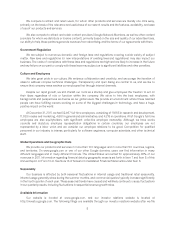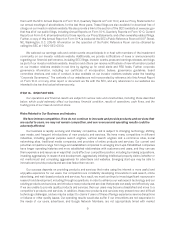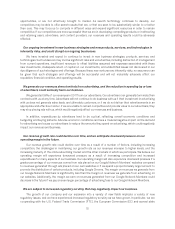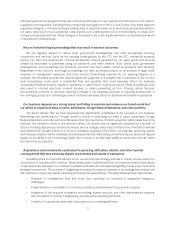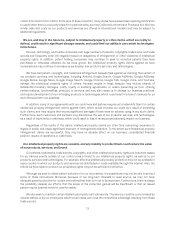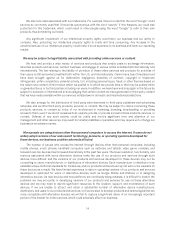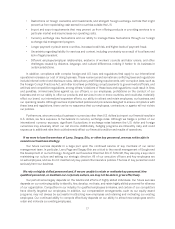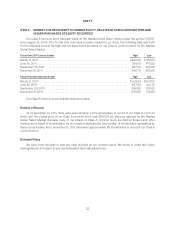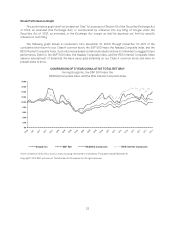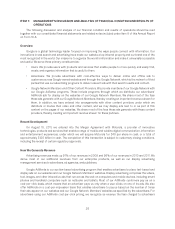Google 2011 Annual Report Download - page 46
Download and view the complete annual report
Please find page 46 of the 2011 Google annual report below. You can navigate through the pages in the report by either clicking on the pages listed below, or by using the keyword search tool below to find specific information within the annual report.• Restrictions on foreign ownership and investments, and stringent foreign exchange controls that might
prevent us from repatriating cash earned in countries outside the U.S.
• Import and export requirements that may prevent us from offering products or providing services to a
particular market and may increase our operating costs.
• Currency exchange rate fluctuations and our ability to manage these fluctuations through our foreign
exchange risk management program.
• Longer payment cycles in some countries, increased credit risk, and higher levels of payment fraud.
• Uncertainty regarding liability for services and content, including uncertainty as a result of local laws and
lack of legal precedent.
• Different employee/employer relationships, existence of workers’ councils and labor unions, and other
challenges caused by distance, language, and cultural differences, making it harder to do business in
certain jurisdictions.
In addition, compliance with complex foreign and U.S. laws and regulations that apply to our international
operations increases our cost of doing business. These numerous and sometimes conflicting laws and regulations
include internal control and disclosure rules, data privacy and filtering requirements, anti-corruption laws, such as
the Foreign Corrupt Practices Act, and other local laws prohibiting corrupt payments to governmental officials, and
antitrust and competition regulations, among others. Violations of these laws and regulations could result in fines
and penalties, criminal sanctions against us, our officers, or our employees, prohibitions on the conduct of our
business and on our ability to offer our products and services in one or more countries, and could also materially
affect our brand, our international expansion efforts, our ability to attract and retain employees, our business, and
our operating results. Although we have implemented policies and procedures designed to ensure compliance with
these laws and regulations, there can be no assurance that our employees, contractors, or agents will not violate
our policies.
Furthermore, since we conduct business in currencies other than U.S. dollars but report our financial results in
U.S. dollars, we face exposure to fluctuations in currency exchange rates. Although we hedge a portion of our
international currency exposure, significant fluctuations in exchange rates between the U.S. dollar and foreign
currencies may adversely affect our net income. Additionally, hedging programs are inherently risky and could
expose us to additional risks that could adversely affect our financial condition and results of operations.
If we were to lose the services of Larry, Sergey, Eric, or other key personnel, we may not be able to
execute our business strategy.
Our future success depends in a large part upon the continued service of key members of our senior
management team. In particular, Larry Page and Sergey Brin are critical to the overall management of Google and
the development of our technology. Along with our Executive Chairman Eric E. Schmidt, they also play a key role in
maintaining our culture and setting our strategic direction. All of our executive officers and key employees are
at-will employees, and we do not maintain any key-person life insurance policies. The loss of key personnel could
seriously harm our business.
We rely on highly skilled personnel and, if we are unable to retain or motivate key personnel, hire
qualified personnel, or maintain our corporate culture, we may not be able to grow effectively.
Our performance largely depends on the talents and efforts of highly skilled individuals. Our future success
depends on our continuing ability to identify, hire, develop, motivate, and retain highly skilled personnel for all areas
of our organization. Competition in our industry for qualified employees is intense, and certain of our competitors
have directly targeted our employees. In addition, our compensation arrangements, such as our equity award
programs, may not always be successful in attracting new employees and retaining and motivating our existing
employees. Our continued ability to compete effectively depends on our ability to attract new employees and to
retain and motivate our existing employees.
17



